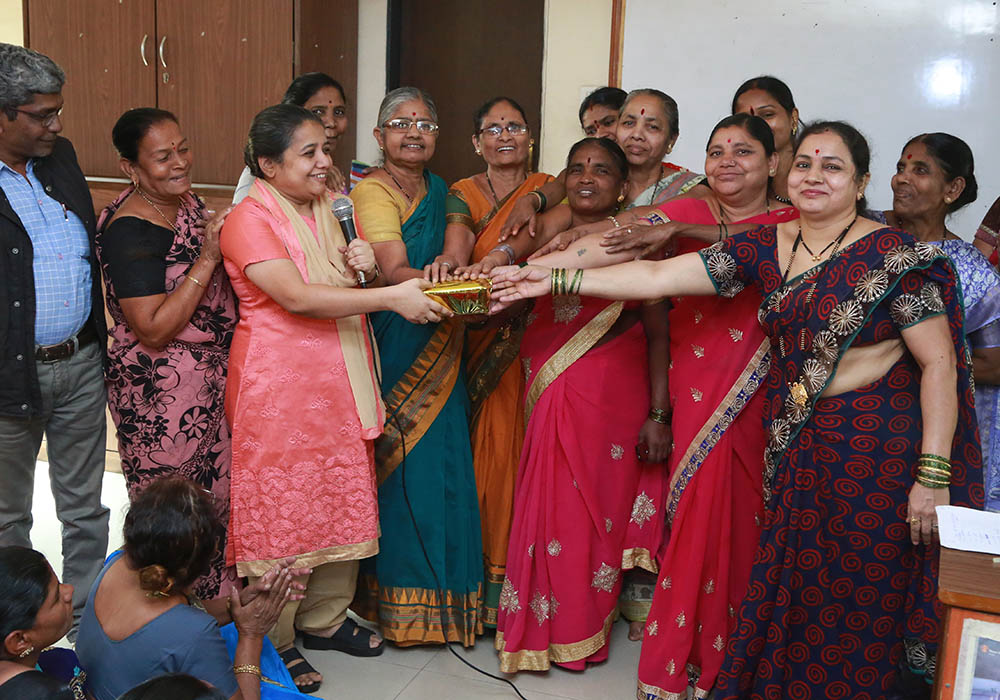
Sr. Christin Mary (in pink, holding microphone), a member of the Missionary Sisters of the Immaculate Heart of Mary and a coordinator of the National Domestic Workers' Movement, with a group of domestic workers in February 2019 in the western Indian city of Mumbai (Provided photo)
Sr. Christin Mary is a member of the Missionary Sisters of the Immaculate Heart of Mary, also known as ICM Sisters.
Based in the western Indian city of Mumbai, Mary coordinates the National Domestic Workers' Movement, which has been championing the rights of domestic workers, children in domestic work, and migrant domestic workers since 1985. Today, its work is spread across 17 states of India, engaging nearly 200,000 domestic workers in major cities, towns and villages.
The movement was set up by Belgian Sr. Jeanne Devos, also of the ICM Sisters, who spent several years as a missionary in India. She was concerned about the plight of Indian domestic workers who were exploited and whose work was undervalued.
Mary shared with Global Sisters Report about her work with the movement. She said the movement has emerged as a ray of hope for thousands of children who were deprived of their childhood and education, rehabilitating and educating them to enter mainstream society. The movement, she said, has set the tone for "breaking the slavery of silence."
"Our journey is a road less traveled," the 47-year-old nun said.
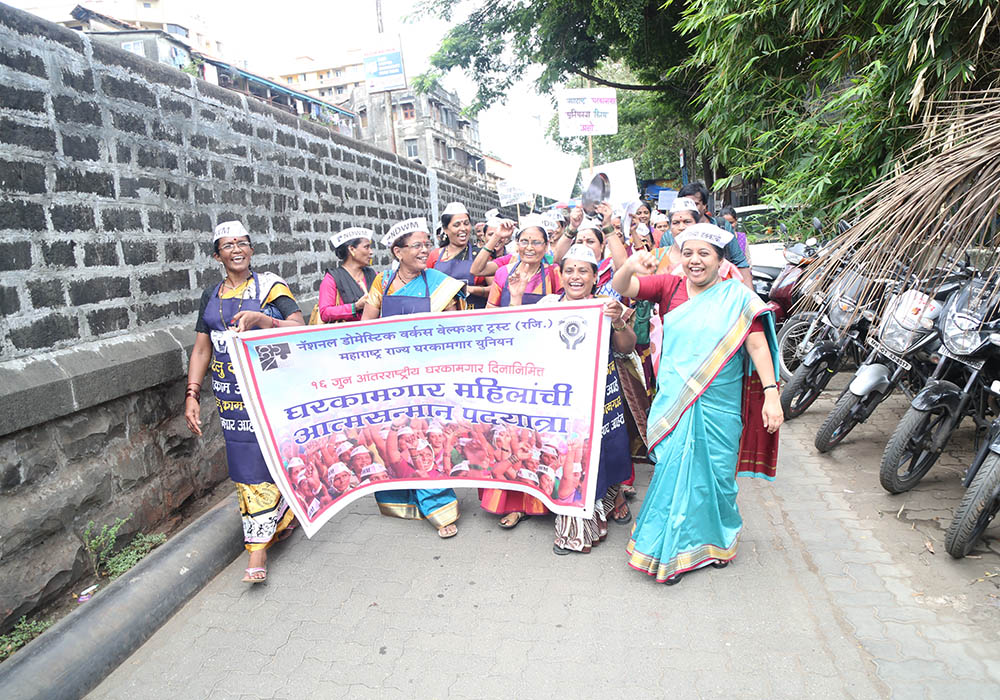
Sr. Christin Mary (front row, right), a member of the Missionary Sisters of the Immaculate Heart of Mary and a coordinator of the National Domestic Workers' Movement, leads a march of domestic workers in Mumbai in June 2017. (Provided photo)
GSR: Why was the National Domestic Workers' Movement started in India?
Mary: The movement was started to empower the Indian domestic workers who had no recognition, no identity, no visibility, and who were treated by the employers like slaves.
The movement strives to empower domestic workers and upholds the rights and dignity of domestic workers. As of now, it operates in 17 states in India in collaboration with several religious congregations. The movement addresses mainly violations of labor rights like lack of decent wages and work conditions. Many have no defined work hours and no weekly breaks. Some are vulnerable to violence, abuse, sexual harassment and trafficking. We also deal with denial of social security benefits like health insurance, maternity protection and old-age pension.
What are the objectives of the National Domestic Workers' Movement? What strategies are used to achieve them?
The objectives are to ensure that domestic workers are organized, educated and empowered for their self-sustained growth. We try to create attitudinal change of employers, the public and lawmakers that domestic work is decent and those domestic workers contribute to the development of the country. We lobby with state and federal governments for minimum wage, ratification of the International Labour Organization Conventions, prevention of trafficking of forced labor and child labor, rescuing child domestic workers and reintegrating them into a normal child-friendly environment. We also promote child-right groups.
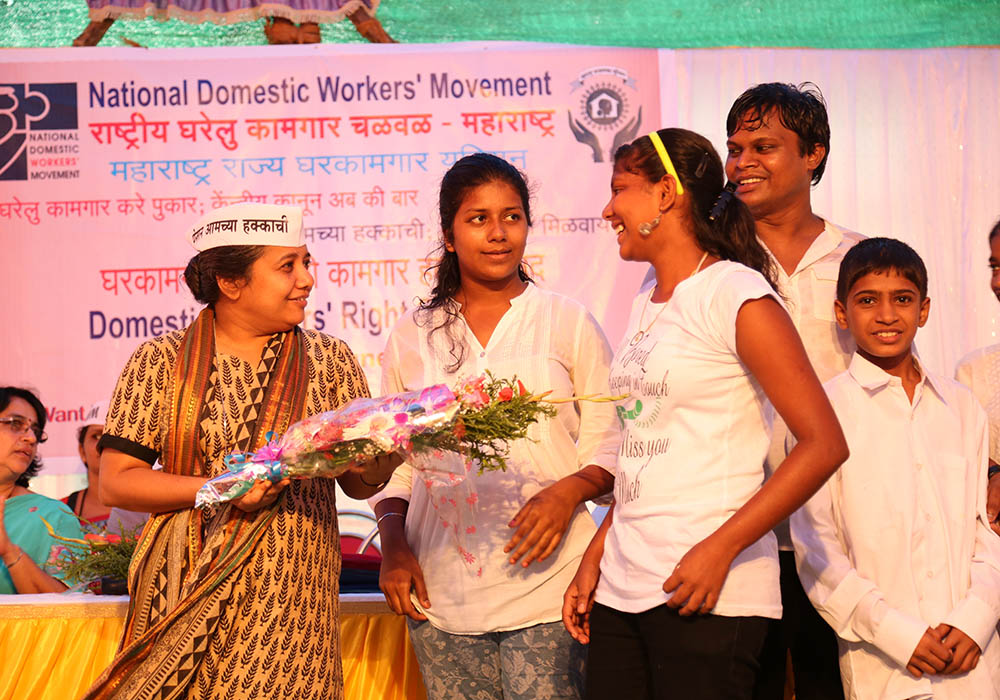
Sr. Christin Mary, left, a member of the Missionary Sisters of the Immaculate Heart of Mary and a coordinator of the National Domestic Workers' Movement, at a meeting in the western Indian city of Mumbai (Provided photo)
Our strategies and actions to achieve our goals are grassroots mobilization, campaigning, influencing decision-makers, meeting the judiciary, media advocacy and coalition-building.
Grassroots campaigning involves mobilizing domestic workers to create awareness about their rights and enhancing their leadership skills so they emerge as leaders and gain confidence to advocate for their rights through capacity-building training and campaigns using signatures, postcards and posters. Organizing public rallies, public meetings and public hearings are also used.
Influencing decision-makers includes establishing proactive engagement with government ministers, civil servants, local officials and politicians from the ruling and opposition political parties and other influential individual organizations. We influence them through face-to-face meetings and submitting memoranda with demands; inviting them for special events like Domestic Workers' Day and Labour Day; sending signatures of the public and postcards written by domestic workers; meeting ministers; and reaching out to the manifesto committees of the political parties during elections.
We go to the judiciary when our advocacy does not work with the governments. We approach the high courts in states and the Supreme Court to challenge the governments and get the support of the judiciary.
Media advocacy is an important factor in our mission. Media have been playing a key role to reach hundreds of thousands of people. Through press conferences and print and electronic media, we highlight the issues of domestic workers to the general public.
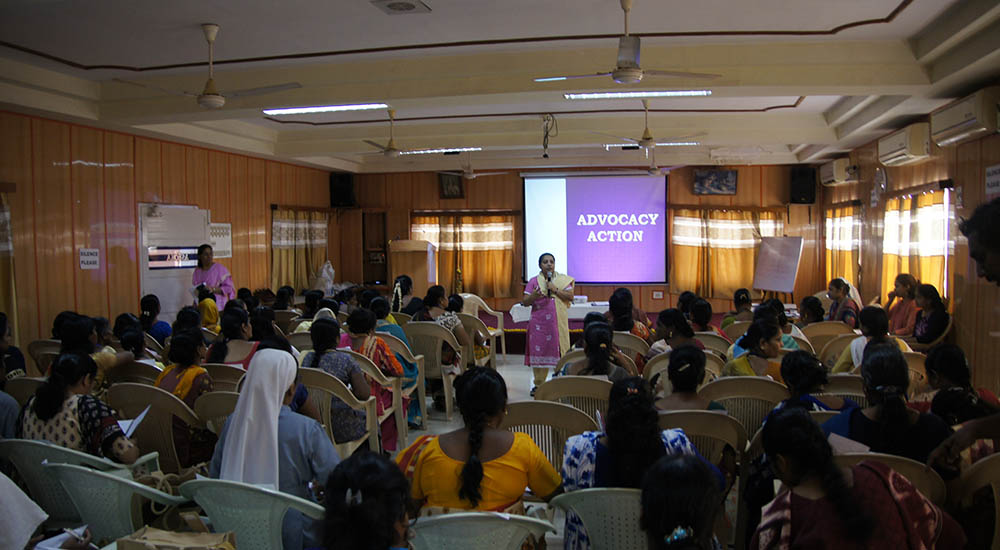
Sr. Christin Mary, a member of the Missionary Sisters of the Immaculate Heart of Mary and a coordinator of the National Domestic Workers' Movement, speaks to a class for a group of domestic workers and their supporters in November 2019 in the western Indian city of Mumbai. (Provided photo)
Similarly, the process of coalition-building is an indispensable component to our mission. By working with like-minded national, regional and international organizations, we gain support, solidarity and visibility to our issues. Joint campaigns have been conducted for comprehensive legislation and setting-up of social security boards. State and national platforms have been formed for improved synergy in putting pressure on governments to swiftly attend to longstanding demands.
Children of domestic workers and other disadvantaged sections are also organized into child rights movement groups. Through these groups, they undergo self-development and leadership development programs. They are equipped to be self-reliant and encouraged to follow their dreams of becoming productive members of society.
What are the achievements of the National Domestic Workers' Movement?
The biggest and lasting accomplishment of the movement has been forging solidarity among domestic workers, who can now hold their heads high with dignity and confidently demand their rights from employers and government officials. There has been a change in the public perception toward domestic work and domestic workers because of our sustained advocacy campaigns of more than three decades.
The National Domestic Workers' Movement's intensive efforts to link workers with different social protection and welfare schemes of the government, such as food security, pension, insurance, educational support for children and medical benefits, have benefited thousands of domestic workers.
Our major advocacy initiatives at all levels of the government and legislature have led to the fixation of minimum wage by 12 states. The government of India has drafted a national policy for domestic workers, in which the National Domestic Workers' Movement has assisted.
Many children have been rescued from forced child labor and rehabilitated to continue their schooling. Children from abused and vulnerable situations are rescued and are given protective shelter in the shelter run by us.
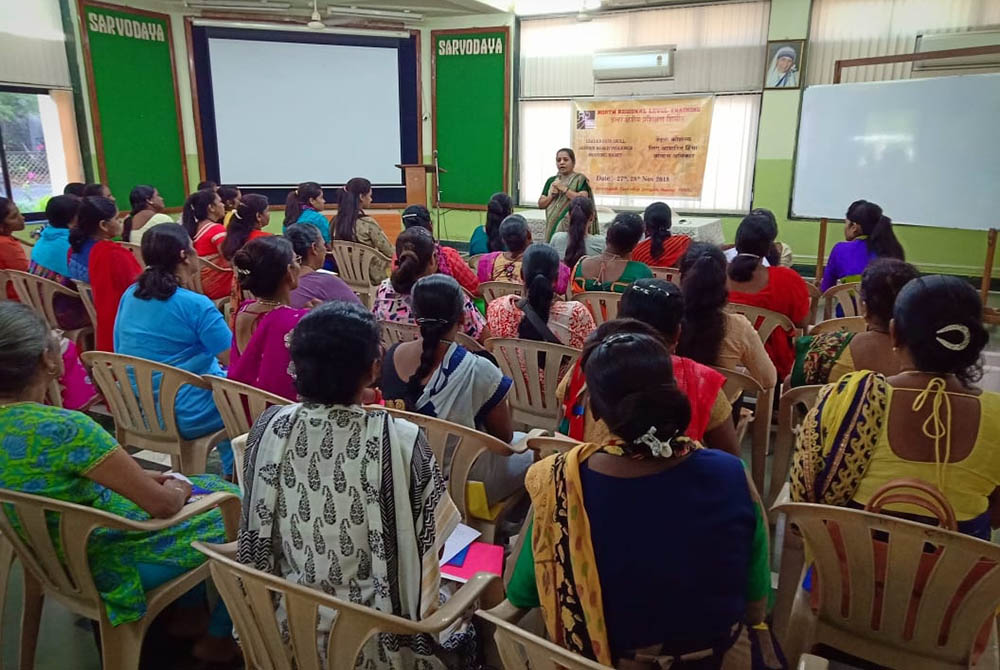
Sr. Christin Mary, a member of the Missionary Sisters of the Immaculate Heart of Mary and a coordinator of the National Domestic Workers' Movement, speaks to a class for a group of domestic workers and their supporters in the western Indian city of Mumbai. (Provided photo)
The children participate in the lobbying and advocacy activities conducted by the National Domestic Workers' Movement for the rights of domestic workers and children in domestic work. The public rallies and media campaigns serve as platforms where the children freely express their views and ideas.
Because of our immediate action to respond to the crisis of the victims of lockdown and continuous solidarity, the work of the National Domestic Workers' Movement got wide recognition and visibility among the people, employers, stakeholders and policymakers.
What are the challenges you face?
Slow response from the governments to protect the rights of workers and the exclusion of workers from the purview of labor laws even after constant lobbying efforts are some of them. Failure of the government to allocate a budget for the welfare board has created difficulties for the domestic workers to avail the social protection schemes on time. Domestic workers also report unfair dismissal when they ask for better wages and working conditions.
Advertisement
How has the National Domestic Workers' Movement responded to the COVID-19 pandemic?
The COVID-19 pandemic has affected millions of domestic workers and migrants. Although the government had announced relief packages, they never reached the poor. The people who don't have access to basic food supplies — especially single women, widows, elderly domestic workers, and interstate migrant workers — were left out of the government benefits.
We took swift action to provide food, face masks and hand sanitizer to the most at-risk people. The relief activities initiated were distribution of food like rice, vegetables, cereal and lentils and distribution of protective items like masks, sanitizers and so on.
Because of the stigma that domestic workers are potential carriers of the coronavirus, employers hesitate to take on domestic workers. The workers were at the risk of losing their jobs and livelihoods. We have identified such vulnerable groups and gave them opportunities for alternative livelihood options, self-employment activities and skills training to earn their livelihoods.
During the pandemic, one of the major problems faced by the domestic workers was domestic violence. Because of the lockdown, we were unable to intervene. When the unlocking phase began, we organized awareness and training on gender-based violence. We could create awareness, and we were able to intervene individually.
What kind of support do you receive from your congregation?
The charism of our congregation is passion for God and people, to serve the poor, especially marginalized women and children. The congregation sent me to the National Domestic Workers' Movement to work with the domestic workers and children. Their trust, solidarity and encouragement are support to the mission.
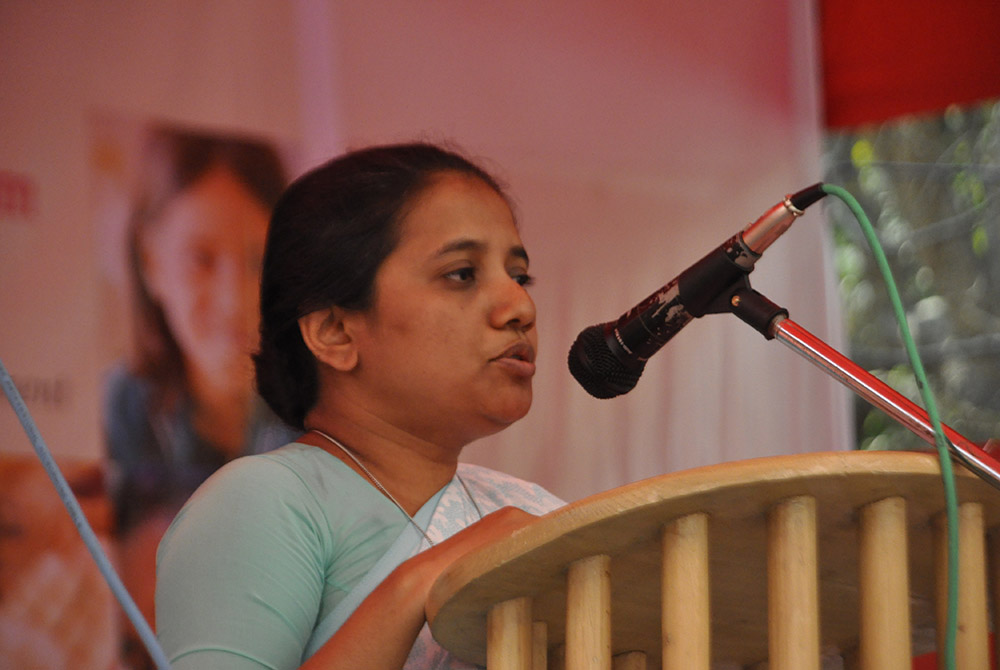
Sr. Christin Mary, a member of the Missionary Sisters of the Immaculate Heart of Mary and a coordinator of the National Domestic Workers' Movement in the western Indian city of Mumbai (Provided photo)
How many congregations are involved in the work of the National Domestic Workers' Movement?
We collaborate with various congregations to coordinate the mission of the National Domestic Workers' Movement in different states. They carry forward the vision and mission of the movement with the team of staff and the leaders of domestic workers.
Apart from us, the congregations collaborating with the movement are the Holy Spirit Sisters, Franciscan Missionaries of Mary, Sisters of Charity of Nazareth, Missionary Sisters of Mary Help of Christians, Good Shepherd Sisters, Prabhudasi Sisters, Augustinian Missionary Sisters, Ursuline Sisters, and Holy Cross Sisters of Kottiyam.
What motivated you to become a woman religious?
When I was a student in a convent school in the southern Indian state of Tamil Nadu, I saw religious sisters helping the poor children who couldn't afford to pay their fees and buy books. In my student days, I heard about the plights of child workers who were forced to sacrifice their childhoods to support their starving families. I used to be disturbed about those children, whose dreams were nipped in the bud. My desire to serve the underprivileged children and women motivated me to become a nun in 2001.







